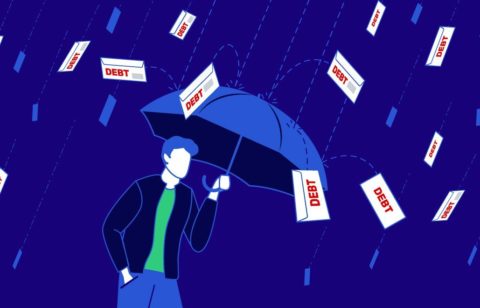The world of debt collection can be a murky place, filled with confusing rules and sometimes even aggressive tactics. While there are plenty of legitimate companies that follow the rules, there are also some that operate in shady ways, tarnishing the reputation of the entire industry.
One of the industry’s lesser-known but quite important secrets is something called “zombie debt.”
Zombie debts are obligations that have been forgotten by borrowers and written off by lenders. Sometimes, when a borrower misses a payment for six months or more, the lender gives up on trying to collect the debt and marks it as a loss — but that’s not always the end of the story.
Debt collectors often buy these old debts for pennies on the dollar. Their goal is to breathe new life into the “dead” debts and convince the borrowers to pay at least a portion of the amount owed. In this way, the debt collectors turn a nice profit for themselves.
Here’s the catch: These zombie debts are often old enough that they are no longer legally enforceable, meaning that collectors can’t sue borrowers to collect the debt. Nevertheless, some debt collectors still harass borrowers with phone calls and letters, hoping they will pay up out of fear or confusion.
Important Information about Zombie Debts
Statute of Limitations
The statute of limitations is a critical legal time frame beyond which debts are considered “time-barred.” Most zombie debts have outlasted this period, meaning they are no longer legally enforceable in courts.
The precise period varies by state and the type of debt. But once it expires, debt collectors lose the legal backing to force repayment through litigation. Knowing when the statute of limitations has expired can empower you to confidently deal with debt collectors and assert your legal protections.
If you’re unsure about the statute of limitations in your state or have concerns about dealing with zombie debt collectors, consider looking for professional advice from a financial advisor or attorney. They can help you navigate the complexities of debt collection and ensure you are not being taken advantage of.
Profit Motive
Debt collectors often buy up zombie debts in bulk for pennies on the dollar, hoping to convince or intimidate debtors into making some kind of payment — no matter how small — on these long-forgotten debts.
This business model relies on volume: Even if the debt collector gets payments from just a small fraction of debtors, the low acquisition cost can still yield high profits, driving collectors to relentlessly pursue these debts.
Ongoing Responsibility
Morally, you may still feel a sense of duty to repay a debt. But from a legal standpoint, the game changes once the statute of limitations has expired.
At that point, debt collectors can still ask you to pay, but they may no longer force you to do so by turning to the courts.
Zombie Debt Collection Tactics
One of the most common tricks debt collectors use is to convince debtors to make a small payment or acknowledge the debt. This is a major trap for unsuspecting consumers, because it resets the statute of limitations. That gives the collector the legal power to sue for the full amount again.
Knowing about this tactic can help you protect yourself from accidentally reactivating an old debt.
Harassment and Pressure
The collection industry is notorious for its sometimes aggressive tactics, including relentless calls, threatening letters and even deceptive statements about the consequences of not paying.
If a debtor gives in to the pressure and makes a payment, the debt sheds its “zombie” status and becomes active again, with all the detrimental effects on the debtor’s credit score and peace of mind.
How to Deal with Zombie Debt Collection
Make a Verification Request
When approached by a collector, the first step should always be to request a written verification of the debt. This forces the collector to provide evidence that the debt exists and that you are the correct debtor.
Remember, asking for verification is not an acknowledgment of the debt.
Keep Communication Records
Maintaining written records of your interactions with debt collectors is crucial for your protection. Opt for certified mail with a return receipt to establish a clear trail of communication, verifying that you requested debt validation and that the collector received your request.
Try to Delay Communication for a While
Under the Fair Debt Collection Practices Act (FDCPA), once you request verification of the debt, collectors must cease all communication until they provide the requested verification.
This temporary halt in harassment can offer you valuable breathing room to consider your options.
Dispute Unverified Debts
If the collector can’t verify the debt or if the debt is not yours, you have the right to send a dispute letter. The collector is then obligated to stop trying to collect until they can prove the debt’s validity.
Cease Communication for Good
Once debt verification is complete and the statute of limitations has expired, you have the right to demand that the collector cease all contact.
This should end contact between you and the collector except for in certain situations, such as notifications regarding any specific actions the collector may take, including filing a lawsuit.
Know Your Rights
Familiarizing yourself with the FDCPA is crucial. This federal law provides a host of protections against abusive, deceptive and unfair debt collection practices.
Your Rights Under the FDCPA
Suing Limitations
The FDCPA enforces the statute of limitations on debt collection, which varies by state but typically ranges from three to six years for most types of debt.
Credit Report Removal
The FDCPA mandates that debts be removed from your credit report seven years after the date of the initial missed payment, which often precedes the charge-off date by several months.
Prohibition of Misinformation
Collectors are prohibited from using deceptive or misleading tactics to collect a debt, including misrepresenting the legal status of a debt or the consequences of non-payment.
Cease and Desist Compliance
If you send a cease and desist letter to a collector, they must stop all communication with you, except for legal notices.
Reporting Restrictions
The FDCPA prohibits the reporting of zombie debts to credit bureaus as if they were active and enforceable debts. This can help protect your credit score from the impact of these outdated financial obligations.
It’s important to note that if a collector violates these regulations, you are empowered to file a complaint through the Federal Trade Commission, the Better Business Bureau, or your state attorney general’s office.
While zombie debts may seem daunting, understanding your rights and the tactics used by debt collectors can empower you to navigate the situation effectively.









